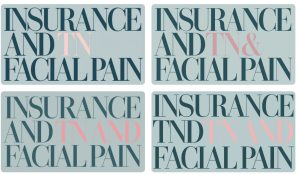 Life Insurance and Trigeminal Neuralgia: Overcoming Barriers in the UK Insurance Market
Life Insurance and Trigeminal Neuralgia: Overcoming Barriers in the UK Insurance Market
By Aneeta Prem
Introduction
Thank you to everyone who has reached out to our helpline with questions and concerns. Many people living with trigeminal neuralgia (TN) face an uphill struggle when seeking life insurance. This article aims to explore the current state of the law in the UK, the challenges posed by TN in securing life insurance, and the options available to those affected. We encourage anyone who has managed to secure life insurance despite such challenges to share their stories, helping others in similar situations navigate this complex terrain.
Understanding the Legal Framework
In the UK, life insurers are legally permitted to consider health conditions when assessing an applicant’s risk profile, as laid out in the Equality Act 2010. This legislation allows insurers to treat applicants with pre-existing conditions, such as trigeminal neuralgia (TN), differently—provided they can back up these decisions with reliable data.¹ TN, characterised by severe, sudden facial pain, presents unique challenges to insurers due to its unpredictable nature and potential complications from treatment. As such, insurers often consider TN a higher risk, which can lead to higher premiums or even refusals of cover.
However, the Equality Act stipulates that any discrimination must be proportionate and based on sound evidence.² Insurers cannot simply make arbitrary decisions; they must rely on robust actuarial or medical data to justify their risk assessments. This requirement aims to prevent unfair treatment of those with pre-existing conditions.
The Reality for Those with TN
For those living with TN, trying to secure life insurance can feel like navigating a minefield. Many insurers see TN as a red flag, often resulting in higher premiums, exclusions, or outright rejection.³ This is largely due to the condition’s severe pain episodes, potential surgical interventions, and the impact these factors may have on overall health.
The Association of British Insurers (ABI) has issued guidelines stating that risk assessments must be evidence-based.⁴ This means insurers should not unfairly penalise individuals without a solid basis for doing so. If you believe an insurer’s decision is not founded on reliable data, you have grounds to challenge it.
Turning to Specialist Brokers and Alternative Providers
Specialist insurance brokers can be particularly valuable for those facing difficulties securing life insurance with a pre-existing condition like TN. These brokers often have access to a wider range of insurers and can offer more tailored advice. They understand the intricacies involved and can negotiate better terms or find providers who are more willing to underwrite policies on a case-by-case basis.⁵
Mainstream insurers such as Legal & General, Aviva, and Zurich have been known to provide cover for individuals with various pre-existing conditions, including TN, albeit often at a higher cost.⁶ It is crucial for applicants to be thorough and transparent when providing medical histories and evidence of their TN management. This approach can help in presenting a more comprehensive picture to insurers, potentially leading to better terms.
Advocacy and Raising Awareness
There is a strong case for advocacy to ensure fairer practices in the insurance industry. Organisations like the Trigeminal Neuralgia Association (TNA) and other patient advocacy groups can play a pivotal role in engaging with insurers and regulators. The goal is to ensure that the criteria for assessing applications are transparent and just. If there are instances of potential discrimination, bringing these to the attention of bodies like the Financial Conduct Authority (FCA) or the Financial Ombudsman Service (FOS) could help to set a precedent for fair treatment.⁷
What to Do If You Are Refused Coverage
If you find yourself facing a refusal or high premiums due to TN, consider the following steps:
- Request a Detailed Explanation: Insurers must provide a written explanation outlining the reasons for their decision. This is not just a courtesy; it’s a legal obligation.⁸
- Explore Other Providers: The insurance market is diverse, and different companies have different approaches to risk. It is always worth shopping around and seeking multiple quotes.
- File a Complaint: If you feel you have been treated unfairly, start with a formal complaint to the insurer. If unsatisfied, escalate the issue to the Financial Ombudsman Service, which offers an independent review.⁹
- Seek Legal Advice: If you suspect that discrimination has occurred, consulting with a legal professional can help you explore your rights under the Equality Act 2010.
Sharing Success Stories
We encourage anyone who has successfully obtained life insurance with TN to share their experiences with us. These stories can serve as a guide and a source of hope for others navigating this often difficult process. By collectively advocating for fairer practices and sharing knowledge, we can help ensure that everyone has a fair chance of securing the coverage they need.
Conclusion
Navigating the world of life insurance with a condition like trigeminal neuralgia can be daunting, but there are options available. From specialist brokers to advocacy efforts, there are ways to challenge unfair practices and push for a more equitable insurance landscape. Insurers, too, must strive to ensure their policies are based on fairness, as well as actuarial data, aligning with the principles set out under UK law.
For further guidance or support, do not hesitate to contact our helpline. We are here to help.
Footnotes:
- Equality Act 2010, Part 3 – Services and Public Functions. Available at: Equality Act 2010
- Ibid.
- Association of British Insurers (ABI). “Guide to Access to Insurance.” Available at: ABI Access to Insurance
- Ibid.
- Money Advice Service. “Finding Insurance with Pre-existing Conditions.” Available at: Money Advice Service
- Legal & General, Aviva, Zurich websites.
- Financial Ombudsman Service. “Insurance Complaints.” Available at: Financial Ombudsman Service
- Ibid.
- Ibid.




